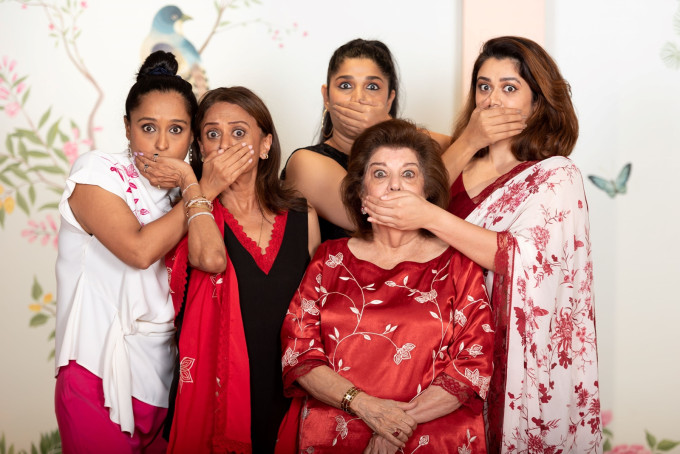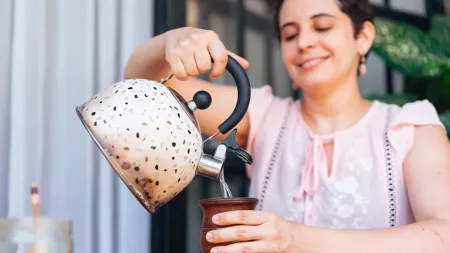Mahabanoo Mody-Kotwal on performing ‘The Vagina Monologues’: ‘India is the only country where more than 30% of each audience is male’
When Mahabanoo Mody-Kotwal first read the script of playwright Eve Ensler’s (now V) The Vagina Monologues, she knew that the play would never be accepted in India. But when she saw the production in the United States and the heartwarming response it got from the audience, she was convinced that it must be brought to the country.
Now, 22 years later, the play is counted as a theatre blockbuster. Taking this success streak further, Picture Perfect Productions and Poor-Box Productions recently launched the Gujarati adaptation featuring actor Kruttika Desai, R J Devaki, Swati Das, Girija Oak, and Mody-Kotwal. Talking about the play’s (and her) journey, the actor – known for films like Black, Phantom, and Freddy – tells us how they proved the naysayers wrong, why the play is and will continue to stay relevant in India, and her most memorable moments in all these years of performing, among others. Her son, Kaizaad Kotwal, chips in too. Read the edited excerpts below:

Q. It’s been over 20 years since you broughtThe Vagina Monologuesto India. How would you describe the experience and the response it’s gotten in the last two decades?
Mahabanoo Mody-Kotwal: This year, on March 8, we started our 22nd year of shows in India and the response, overwhelmingly, has been consistently fabulous. It would be no understatement to say that many lives have been changed in the last two decades and more, none more than mine and Kaizaad’s. When we started, we were told it would close before 10 shows were completed. How the naysayers have been proven wrong!
Q. What inspired you to bring it to India, a country that still considers sex a taboo topic?
Mahabanoo Mody-Kotwal: When my son sent me the script in the late 1990s, I told him it would be impossible to do the play in India. Then, a few years later, while visiting my daughter in Atlanta, I saw the play at the Roxy Theatre. When I witnessed almost 1,500 audience members whooping and hollering, laughing, and crying so vocally, I remember coming out of the theatre, and even before getting into the car, telling my son that we must do the play in India.
Kaizaad Kotwal: Sex is still, 22 years later, a taboo topic, and yet things are changing. Some of the facades are falling away. But there is much yet to be done. We will sell everything with sex, from beer to washing machines, and yet, real, comprehensive sex education remains almost invisible in India.
View this post on Instagram
A post shared by Swati Das (@das_swati_das)
Q. How, in all these years, would you say has Indian society evolved in terms of accepting a drama that touches upon subjects like sex, menstruation, prostitution, reproduction — topics that are usually brushed under the carpet?
Mahabanoo Mody-Kotwal: It’s a very mixed bag, this evolution. Attitudes toward sex and sexuality vary with region, community, economic background, and so on. We still have chemists and other stores wrap packets of sanitary napkins in newspapers and brown paper when women go to buy these. What is so shameful about a woman’s period that we still hold on to these habits? Our attitudes towards sex workers are largely barbaric. What most people don’t know is that, at least in Mumbai, one of the largest clientele demographics in the red-light areas is college-going men. There is always this desire to demonise the sex worker and yet think nothing about why these women are in this profession.
Kaizaad Kotwal: Marital rape is still not outlawed in this country; this should be intolerable for us all. India has taken over from China as the world’s largest population and yet the majority attitude is that Indians don’t have sex! What a joke. Sure 1.6 billion of us can’t all be immaculate conceptions.
Q. After English and Hindi, the play premiered in Gujarati. Why did you pick this language?
Mahabanoo Mody-Kotwal: Gujarati is the language of my family, and my family roots are in Gujarat. Also, Gujarati theatre audiences are one of the most frequent theatre-going audiences. Ideally, this play should reach everyone in the world in their closest language, because that is when it will resonate the most with an individual.
 The cast of Vagina Monologues. (Photo: PRhandout)
The cast of Vagina Monologues. (Photo: PRhandout)
Q. When you first approached the women to be part of your play, were they willing to? What were they most hesitant about? Did you ever approach a celebrity to play a part?
Mahabanoo Mody-Kotwal: When we first started looking for actors in 2002, many actors, especially stars and celebrities, immediately said no. One actor proclaimed, “Oh, how can I? What will I tell my guru?” But then I got a hold of Dolly Thakore who immediately said yes. After that, Jayati Bhatia joined with Avantika Akerkar, and Sonali Sachdev followed. In the last 22 years, we have had almost 20 actors work in various language productions, and many actors requested to be auditioned to be part of the play.
Q. Despite its success, the play has had its share of roadblocks, including a lack of sponsors and being denied permission. How did you deal with such hiccups?
Kaizaad Kotwal: This could be the subject of a whole book. Largely, we have faced very few real roadblocks. The only place we were denied permission was in Chennai in 2004 when we were to perform with Jane Fonda, Marissa Tomei, and V. But since then, we have been to Chennai many times and had hugely successful shows. Frankly, most of our detractors have come from the theatre community. We are persona non grata and several theatres in Mumbai refuse us permission to perform the play. Many theatre practitioners have spoken very ill about the play and us. But ultimately, the longevity of the play speaks for itself. And what speaks even more loudly is the change the play has initiated in individuals and society at large
Q. For you, what has been the most satisfactory thing about the play since you started performing it?
Mahabanoo Mody-Kotwal: Meeting V completely changed our lives and put my son and me on this trajectory of not only doing the play, but also working hard to try and end violence against women and girls. We have also met some other fabulous people through this show like Dr Armida Fernandez and Dr Nayreen Daruwalla of SNEHA, an NGO based in Dharavi, whom we have partnered with for over 23 years now. There’s Susan Swan, the head of V’s activist movement V-Day, who is an amazing human and formidable warrior herself. Meeting Jane Fonda and acting with her was definitely a highlight of my life. We have done many shows for women from economically disadvantaged bastis (slums) across Mumbai and also for high school students. These in many ways are the most meaningful interactions and memorable shows. With both these groups we conduct intense workshops and resource sharing sessions after they have seen the play.
Q. Would you like to share any anecdotes of someone coming and sharing something with you after a performance that has stayed with you?
Mahabanoo Mody-Kotwal: Oh, there are lots of stories over the 22 years we’ve been performing. One story that really sticks out in my mind is when I was on a flight to Delhi, waiting for take-off, when a young woman got up from across the aisle and said, “Mrs Mody-Kotwal, may I give you a hug?” I was quite taken aback, but said “Sure, but I’d like to know why.” So, she took out her mobile phone and showed me a picture of herself with a man, taken at one of my shows, and said, “This was the happiest day of my life.” I was thrilled as one of the taglines of the play is, ‘If you want to find a good man, go watch the Vagina Monologues’. So, I said, “I’m so glad you found your life partner at our show.” Now brace yourself for her answer! She laughed and said, “No ma’am, after seeing your play, I decided to walk out of a three-and-a-half-year-long abusive marriage. I decided to commemorate that moment by making him stand next to me and clicking this picture.” I was totally stunned and shakily said, “I don’t know whether to feel happy or sad.” And she hugged me tightly and said, “Oh please don’t be sad. It was the best decision I have ever made, and I’m very happy.”
There were some instances where women have fainted during the powerful scene of a young girl being raped by her uncle. One of the young women who had fainted during a show in Mumbai later told us that her little sister, 10 years old, had been raped by her uncle and she had walked in on that. The parents did nothing as is mostly the case in family-based sexual violence. But this girl had beaten him up on behalf of her sister. Six months after this incident, we were performing in Delhi, when a young woman came backstage and asked us if we remembered the girl who had fainted in Mumbai and narrated the rape of her sister. “Well,” she said, “I’m the sister who was raped. Your play has brought a certain closure for us. Thank you.”
View this post on Instagram
A post shared by Neelam Kumar https://amzn.eu/d/cRp8Hx (@lifecoachneelam)
Q. How have men warmed up to the play in all these years?
Mahabanoo Mody-Kotwal: They have always been a very supportive part of our audiences. In fact, India is the only country where more than 30 per cent of each audience is male. The world over, including in the US, women make up almost 80 to 90 per cent of the audience.
Q. What do you think still makes the play relevant?
Mahabanoo Mody-Kotwal: Sadly, violence is perennial and ubiquitous; and till it stops this play will always be relevant. The real tragedy is that when we started doing the play 22 years ago, we thought that the rates of violence were unacceptable. They have only continued to get worse.
Kaizaad Kotwal: For centuries, gender-based discrimination and gender-based violence have not only been a way of life, but the very foundation of many societies which are patriarchal in nature. That sadly has waxed and waned over the larger timeline of history, but we as a species have never managed to create true equality and true safety for all women around the world. Even the toxic versions of capitalism have declared war on the bodies, minds and souls of women. Religion, politics and other social, cultural and economic structures continue to impose violence and marginalisation on millions of women across the world. In every country, for a number of reasons, institutions and individuals have declared a war on women’s and girl’s bodies. And till we stop this violence, true progress and modernity will always elude the world.
The Vagina Monologues will be performed at Bharatiya Vidya Bhavan: Chowpatty, Mumbai on April 7 at 7.30 pm
Disclaimer: The copyright of this article belongs to the original author. Reposting this article is solely for the purpose of information dissemination and does not constitute any investment advice. If there is any infringement, please contact us immediately. We will make corrections or deletions as necessary. Thank you.





